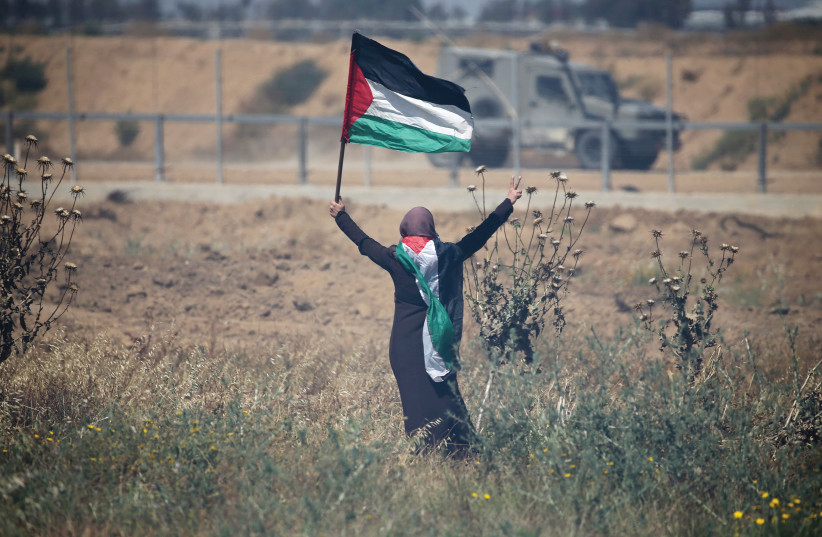In the wake of an Israeli government-initiated report presenting Israel’s legal rights in Judea and Samaria (the West Bank), opponents of settlements argue that the issue is not about Israel’s legal and historic rights, but about morality. I assume that means supporting Palestinian self-determination and establishing a second Arab Palestinian state west of the Jordan River. But, will it bring peace?
In this view, anything which inhibits this goal is considered immoral. Ergo, it is immoral for Jews to live in Judea, Samaria and eastern Jerusalem, a.k.a. occupied Palestinian territories (OPT). Moreover, justice for Palestinians, a.k.a. the Palestinian right of return, is hyped as a moral obligation.
Accordingly, not only can Israel not survive without another Palestinian state, it should not.
As Tel Aviv University Prof. Chaim Gans wrote in A Just Zionism: On the Morality of the Jewish State, (Oxford University Press, 2008), it is a “moral duty… not to undermine the partition plan of 1947,” “there were significant justifications for the Arabs’ opposition to Jews’ return to the Land of Israel,” “Jews have a special moral obligation to understand [it],” and Jews caused “considerable injustice to the Arabs.”
This turns Arab political aspirations into a moral crusade. As Zionism legitimizes a Jewish state, Palestinianism justifies another state. Nothing else matters, not even Arab Palestinian terrorism and incitement. Jewish guilt trades for Arab victimization.

Yet, on what ethical principles is this morality based? Is Palestinian statehood and self-determination a moral right, regardless of its purpose and content? Does it trump genuine legal and historical claims?
According to demographic arguments, Israel should not control the lives of millions of Arabs living in Judea and Samaria or, for that matter, anywhere. A mutually agreed upon solution was provided in the Oslo Accords and subsequent agreements, in which the area was divided into zones: Areas A and B, which comprised all major Arab population centers and most towns, were given to the Palestinian Authority (PA); nearly all Arab Palestinians live under PA control. Area C, in which over 350,000 Jews live along with an estimated several tens of thousands of Arabs, remained under Israeli control. Core issues like settlements, Arab refugees and eastern Jerusalem were left for final status negotiations.
Since most Arab communities are separated geographically under this arrangement and building in Jewish communities (settlements) continues, it is argued that Israel is still illegally occupying the entire area, thus preventing the establishment of a Palestinian state, which raises the moral and ethical issue.
Palestinians and their supporters argue that they are entitled to self-determination as much as Jews. That would seem to mean a two state solution, “two states for two peoples.” However, here is where the moral arguments break down.
Muslim and Arab and Palestinian leaders refuse to accept Israel’s right to exist. Jihadist Islamists control the Gaza Strip and are poised to take over the West Bank areas. Hezbollah threatens Israel from southern Lebanon and Syria. Every Israeli withdrawal ostensibly to advance the peace process has been a strategic failure. Surrounded by hostile Arab countries in turmoil and civil war, Israel’s survival depends on its ability to defend itself. That too is a moral issue.
Consequently, the moral argument for Palestinian self-determination and statehood compete with moral arguments for Israel’s existence. If the moralists are correct, Israel’s crime was not in winning the war against Arab aggression in 1967, but its survival and victory in 1949.
As long as Palestinians are unwilling to renounce their intent to destroy Israel and reject reciprocity, why should Israel continue to make concessions?
Opponents of settlements have led us into the trap of believing that creating another Arab Palestinian state in Judea, Samaria and Gaza will satisfy Arab demands for Israel’s elimination. Moreover, using moral arguments masks an even more confused belief that Israel and Jews are guilty for alleged crimes against the Palestinian people when the State of Israel was established, ensuing war and dislocation, Arab refugees and the failures of Palestinianism.
The UN and the media transformed the image of the PLO from a terrorist organization into a national liberation movement and a moral imperative. “One man’s terrorist is another’s freedom fighter” and “justice for Palestinians” became incantations of moral sophistry.
Arguments for a Palestinian state should be made on its merits, not on guilt-feelings, apologies for Israel’s existence and scorning Jews who live over the Green Line.
Fear-mongering by some Diaspora-minded Jews about what the goyim will say is shameful, not only because it denies the truth of Jewish claims, but it causes suffering to others.
Jewish and Israeli uber-moralists who oppose the Levy Report, which detailed Israel’s rights in the area by offering moral flicks instead of serious legal arguments ignore reality and undermine the purpose, ethos and sovereignty of the Jewish people in the Land of Israel.
In fact, “the two state solution,” rather than promoting peace, ensures that the conflict will continue by promoting the Palestinian narrative, the Nakba, the attempt to destroy Israel in 1948. “Ending the occupation,” as supporters of Palestinians claim, means the entire area “from the river to the sea.”
That is the moral issue.
The author is a PhD historian and journalist in Israel.
